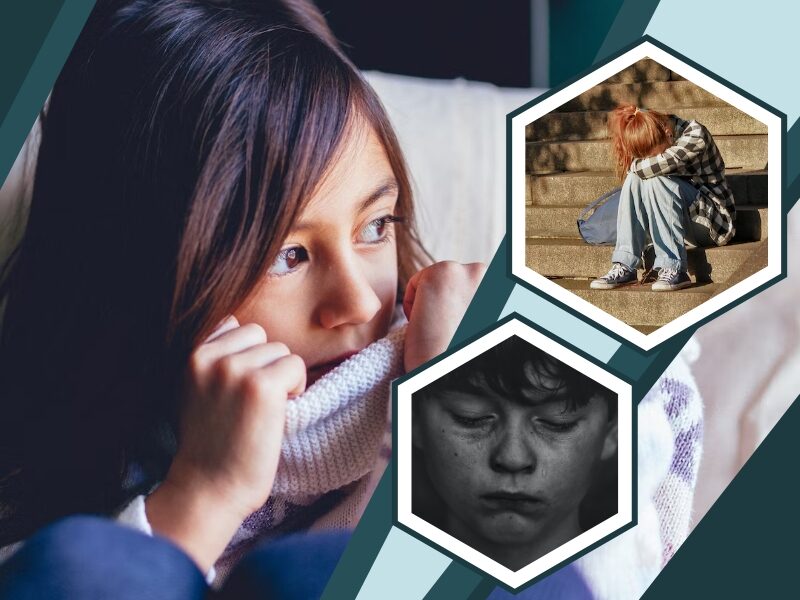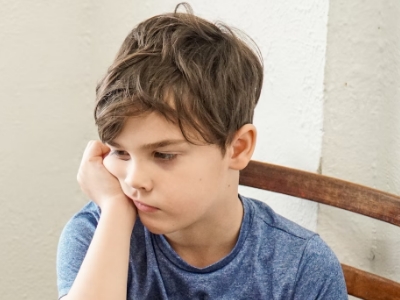Depression in Children: Symptoms and How to Treat It?

Depression in children is an uncommon case. However, many children have fears and worries and may feel sad and hopeless from time to time. Strong fears may appear at different times during growth. Although fears and worries are typical in children, persistent or extreme forms of fear and sadness could be due to anxiety or depression.
Symptoms of Depression in Children

- Crankiness or anger
- Continuous feelings of sadness and hopelessness
- Social withdrawal
- Feelings of worthlessness or guilt
- Impaired thinking or concentration
- Thoughts of death or suicide
- Physical complaints such as stomachaches
- Frequent headache
- Changes in appetite
- Excessive sleepiness or lack of sleep
- Sensitive to rejection
- Changes in appetite, either increased or decreased
- Trouble concentrating
- Fatigue and low energy
- Trouble during events and activities
- Loss of hobbies and interest
What Causes Depression in Children?
Up to 3% of children and 8% of adolescents in the U.S. have depression. The condition is more common in boys under the age of 10. But by age 16, girls have a greater incidence of depression. It can be caused by any combination of things that relate to physical health, family history, life events, environmental influence, genetic vulnerability, and biochemical disturbance.
How Common is Depression in Children?
Depression is among the most common mental health disorders in children. About 3% have depression which tends to be higher in older children and teenagers between the ages of 12 and 17. An estimated 3.2 million adolescents aged 12 to 17 in the US had at least one major depressive episode. This number represented 13.3% of the U.S. population aged 12 to 17.
How to Diagnose Depression in Children?
If your child has been experiencing symptoms of depression for at least 2 weeks, schedule an appointment with their doctor to make sure there are no physical reasons for the symptoms and to ensure proper treatment is provided. A consultation with a mental health care professional who specializes in children is also recommended.
A mental health evaluation should include interviews with you and your child and any other psychological testing that is needed. It can be beneficial to get information from teachers, friends, and classmates to show that these symptoms are consistent during your child’s various activities and are a marked change from previous behavior. In addition to information about the child’s personal characteristics, questionnaires can be very helpful in helping diagnose depression in children.
Managing the Condition and Staying Healthy
It is not known exactly why some children develop this condition but factors may play a role, including biology and temperament. Life experiences such as trauma, maltreatment, bullying, rejection, and stress can trigger the condition. Here are ways you can do as a guardian or parent on managing this condition.
- Ensure that your child maintains a healthy eating plan centered on fruits, vegetables, lean protein sources, and nuts and seeds.
- Allow your child to participate in physical activities every day. You can also plan recreational activities at home to prevent them from isolating.
- Be a good listener to your child and be open-minded to understand that things are not the same for everybody.
- Let your child get the recommended amount of sleep each night.
- Ensure that you are always present especially during the hard times and help your child come up with healthy solutions to his/her problems.
- Practice mindfulness or relaxation techniques.
How to Treat Child Depression?
Treatment options for children with depression are like those for adults. Doctors may recommend medication, psychotherapy, and or a combination of both. During psychotherapy, your child will talk to a licensed and trained mental health care professional to identify and work through the factors that may be triggering the depression.
There is a wide range of available antidepressants and your doctor will choose the best treatment for your child. Note that there no single best antidepressant, and the best one for your child depends on the symptoms and individual needs.



